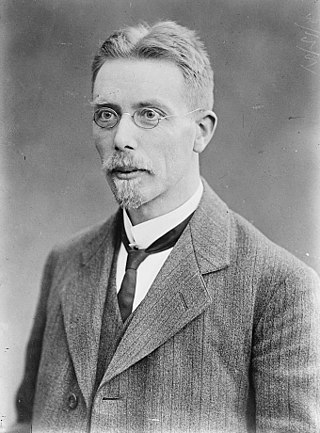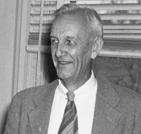Related Research Articles

Alcoholics Anonymous (AA) is a global peer-led mutual aid fellowship begun in the United States dedicated to abstinence-based recovery from alcoholism through its spiritually inclined twelve-step program. AA's twelve traditions, besides stressing anonymity, establish it as non-professional, unafiliated, non-denominational and apolitical with a public relations policy of attraction rather than promotion. In 2020 AA estimated a worldwide membership of over two million, with 75% of those in the US and Canada.

John James Rickard Macleod,, was a Scottish biochemist and physiologist. He devoted his career to diverse topics in physiology and biochemistry, but was chiefly interested in carbohydrate metabolism. He is noted for his role in the discovery and isolation of insulin during his tenure as a lecturer at the University of Toronto, for which he and Frederick Banting received the 1923 Nobel prize in Physiology or Medicine.

Schack August Steenberg Krogh was a Danish professor at the department of zoophysiology at the University of Copenhagen from 1916 to 1945. He contributed a number of fundamental discoveries within several fields of physiology, and is famous for developing the Krogh Principle.

The Yale School of Medicine is the medical school at Yale University, a private research university in New Haven, Connecticut. It was founded in 1810 as the Medical Institution of Yale College and formally opened in 1813.

Homer William Smith was an American physiologist and science writer known for his experiments on the kidney and philosophical writings on natural history and the theory of evolution.

Dickinson Woodruff Richards Jr. was an American physician and physiologist. He was a co-recipient of the Nobel Prize in Physiology or Medicine in 1956 with André Cournand and Werner Forssmann for the development of cardiac catheterization and the characterisation of a number of cardiac diseases.
Elvin Morton "Bunky" Jellinek, E. Morton Jellinek, or most often, E. M. Jellinek, was a biostatistician, physiologist, and an alcoholism researcher, fluent in nine languages and able to communicate in four others.

Ivan Mikhaylovich Sechenov was a Russian psychologist, physiologist, and medical scientist.

The Journal of Studies on Alcohol and Drugs (JSAD) is a peer-reviewed scientific journal that publishes original research articles on various aspects of the use and misuse of alcohol and other drugs. Topics covered include the biological, medical, epidemiological, social, psychological, and legal aspects of alcohol and other drug use, abuse, and dependence. The journal was established in 1940 as the Quarterly Journal of Studies on Alcohol and changed its name in 1975 to Journal of Studies on Alcohol before obtaining its current name in 2007. The journal appears bimonthly and publishes supplements at irregular intervals. The Journal of Studies on Alcohol and Drugs is a not-for-profit journal based in the Center of Alcohol and Substance Use Studies at Rutgers University.
Physiological Reviews is a journal published quarterly by the American Physiological Society which has been published since 1921. The editor in chief of the journal is Sadis Matalon. The journal's first managing editor, who served to his death in 1946, was Dr. Donald R. Hooker. Among the cadre of editors at the journal's inception were William Henry Howell, Lafayette Mendel, and John Macleod. From 1932 to 1950, the chairman of the board of editors of the journal was Anton J. Carlson. Other notable people who have served on the journal's editorial board include John Jacob Abel (c.1935), Ernest William Goodpasture (c.1938).
The American Physiological Society is a non-profit professional society for physiologists. It has nearly 10,000 members, most of whom hold doctoral degrees in medicine, physiology, or other health professions. Its mission is to support research and education in the physiological sciences. The society publishes 16 peer-reviewed journals, sponsors scientific conferences, and sponsors awards to further this mission.

Barend Joseph Stokvis was a physician and professor of physiology and pharmacology at the University of Amsterdam. He is mainly remembered for his description of acute porphyria in 1889. As a researcher in chemical pathology he made contributions to the understanding of a number of diseases, such as diabetes. He was also considered an expert in tropical medicine and a celebrated medical educator. He authored an influential pharmacology textbook. Stokvis was one of a number of prominent 19th century Jewish physicians in the Netherlands.
Bal Krishan Anand (1917–2007) was an Indian physiologist and pharmacologist. He was credited for the discovery of the feeding centre in the hypothalamus in 1951. He is considered the founder of modern Neurophysiology in India.

Mark S. Gold is an American physician, professor, author, and researcher on the effects of opioids, cocaine, tobacco, and other drugs as well as food on the brain and behavior. He is married to Janice Finn Gold.
United States v. 11 1/4 Dozen Packages of Articles Labeled in Part Mrs. Moffat's Shoo-Fly Powders for Drunkenness, 40 F. Supp. 208, was a 1941 US federal court case heard in the United States District Court for the Western District of New York, alleging the misbranding of a putative cure for alcohol intoxication. The action's unusual name results, in part, from the customs of cases with in rem jurisdiction, and refers to 135 packages of the containers used to hold the powder. This case was one of the first actions taken by the United States Food and Drug Administration.
The Center of Alcohol Studies (CAS) is a multidisciplinary research institute located in the Busch Campus of Rutgers University, which performs clinical and biomedical research on alcohol use and misuse. The center was originally at Yale University and known as the Yale Center of Alcohol Studies, before it moved to Rutgers in 1962. The CAS is also home to the peer-reviewed Journal of Studies on Alcohol and Drugs (JSAD), the oldest journal on alcohol studies; and a library of alcohol literature. Early research in the 1940s at the CAS helped support the disease model of addiction that helped change public perception on alcohol consumption.

Walter Richard Miles was an American psychologist and a president of the American Psychological Association (APA). He best known for his development of the two-story rat maze, his research on low dose alcohol, the development of red night vision goggles for aviation pilots, and the reduction of performance in aging individuals. However, the theme of his academic career was his fascination with apparatuses to measure behavior. C. James Goodwin (2003) noted that Miles "never became a leading figure in any particular area of research in psychology... but drifted from one area to another, with the direction of the drift determined often by the presence of a particular type of apparatus or an apparatus-related problem that intrigued him" (p. 58).

Isaac Jennings was an American physician and writer who pioneered orthopathy.

Henry Alfred Schroeder M.D., F.A.C.P was an American physiologist and writer.
References
- 1 2 3 4 5 Blocker, Jack S; Fahey, David M; Tyrrell, Ian R. (2003). Alcohol and Temperance in Modern History: An International Encyclopedia, Volume 1. ABC-CLIO. p. 285. ISBN 1-57607-833-7
- ↑ Faulconer, Albert; Keys, Thomas Edward. (1965). Foundations of Anesthesiology, Volume 1. C.C. Thomas. p. 321
- ↑ Allred, N; Bejarano, W; Ward, J. (2017). Howard Wilcox Haggard and the Institutionalization of Modern Alcohol Studies. Journal of Studies on Alcohol and Drugs 78 (2): 325-329.
- ↑ Anonymous. (1929). Review: Enemies Of Medical Science. Reviewed Work: Devils, Drugs, And Doctors by Howard W. Haggard. The British Medical Journal 2 (3598): 1163
- ↑ Curtis, James R. (1931). Reviewed Work: Devils, Drugs and Doctors. Social Science 6 (3): 324-325.
- ↑ Matthews, N. Sanford. (1932). Reviewed Work: The Lame, the Halt and the Blind by Howard W. Haggard. Bios: A Quarterly Journal of Biology 3 (4): 194-195.
- ↑ Anonymous. (1930). Reviewed Work: The Conquest of Superstition by Science. Devils, Drugs, and Doctors by Howard W. Haggard. Science Progress in the Twentieth Century (1919-1933) 25 (97): 125-128.
- ↑ "The Doctor In History". Kirkus Reviews.